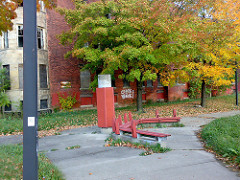
There is something called the “broken windows” theory in criminal justice. Put simply, the idea is that small amounts of visible social transgression – broken windows, graffiti, and so on – signal that larger amounts of social transgression (read that as “crime”) are acceptable in that place. While fixing the broken windows does not necessarily solve existent crime, it signals a community’s unwillingness to tolerate even those kinds of small social transgressions.
But this principle isn’t widely recognized in economic development. In my region, affluent suburbs and bedroom communities see their goals as different than that of the less-affluent urban core. I suspect they’re wrong – and any econ (or other social science) type is more than welcome to do the legwork on this.
Seriously – use this idea if you can. I know lots of people who have a hard time generating things to study in economics. I’d just ask that you cite me in the works cited, and let me know, because I’ll want to reference your work as well.
So here’s the project:
Hypothesis: The future economic health of an entire Metropolitan Statistical Area is directly effected by the number of census tracts within the MSA that are in poverty.
Methodology: Find several (at least two) MSAs with roughly equivalent population, number of census tracts and aggregate city income (or even per capita income, really) in the past. I’d suggest 1970, but you can look further back. You’d also need to control for national, regional, and industrial economic change as much as possible.
Evaluate the levels of various economic health markers – median income, net job change, relocation rates, education rates and test scores – in one MSA during that time period. Also determine how many tracts (or even census blocks) within that MSA are in poverty during that time period.
Repeat with your other MSA(s).
I would predict that an increase of census tracts in poverty correlates to and precedes a decline in overall MSA economic health. Likewise, a decrease of census tracts in poverty correlates to and precedes an increase in overall MSA economic health.

It’s that preceding part – and the statistics to show that it’s a signficant predictor of overall economic health – that is going to be the important results.
While this would show correlation- not causation – that would still suggest that there’s some validity to apply the “broken windows” philosophy to local economic development. Use regressional analysis and all that other funky stats stuff to try to control for other effects as best you can, of course.
On the one hand, this seems like a pathetically obvious proposition.
As we look at the decisions of regional government officials – or even citizens in our regions – it appears that this isn’t as obvious as it seems to me. The practical result – if correct – is to realign the expectations of those in more affluent areas so that they include those in less affluent ones. That is, make explicit that helping other areas get out of poverty will help the economic outcome of affluent areas as well.
Or at the very least, that not helping others will hurt.economics, research project, study, poverty
